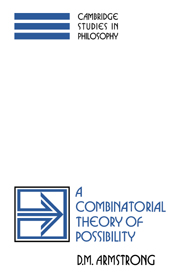Book contents
- Frontmatter
- Contents
- Preface
- PART I NON-NATURALIST THEORIES OF POSSIBILITY
- PART II A COMBINATORIAL AND NATURALIST ACCOUNT OF POSSIBILITY
- 3 Possibility in a simple world
- 4 Expanding and contracting the world
- 5 Relative atoms
- 6 Are there de re incompatibilities and necessities?
- 7 Higher-order entities, negation and causation
- 8 Supervenience
- 9 Mathematics
- 10 Final questions: logic
- Works cited
- Appendix: Tractarian Nominalism, by Brian Skyrms
- Index
7 - Higher-order entities, negation and causation
Published online by Cambridge University Press: 05 June 2012
- Frontmatter
- Contents
- Preface
- PART I NON-NATURALIST THEORIES OF POSSIBILITY
- PART II A COMBINATORIAL AND NATURALIST ACCOUNT OF POSSIBILITY
- 3 Possibility in a simple world
- 4 Expanding and contracting the world
- 5 Relative atoms
- 6 Are there de re incompatibilities and necessities?
- 7 Higher-order entities, negation and causation
- 8 Supervenience
- 9 Mathematics
- 10 Final questions: logic
- Works cited
- Appendix: Tractarian Nominalism, by Brian Skyrms
- Index
Summary
HIGHER-ORDER ENTITIES
In his article ‘Tractarian Nominalism’ (1981) Skyrms raises the question, ‘In what sense is Tractarian Nominalism nominalism at all?’ He then remarks, ‘It is certainly not nominalism in the sense of Goodman [“A world of individuals”] or Quine [“On what there is”], since it finds quantification over properties and relations … just as acceptable as quantification over individuals, and cashes both in terms of facts’ (p. 202).
Skyrms's facts, of course, are our states of affairs. Only the terminology is different. And since for Skyrms, as for us, different individuals may have the same property or be related by the same relation, and that in no mere Pickwickian sense, his properties and relations can fairly be described as universals. So why Tractarian Nominalism? Nominalists reject universals.
Skyrms goes on to answer his question thus:
Its properties and relations are all properties and relations of [first-order] individuals and its facts are all first-order facts: facts ‘about’ individuals. There are no higher-order facts, (p. 202)
By way of clarification, Skyrms makes an important qualification of this stand. He will admit ‘higher-order’ facts that are logically determined by first-order facts, but:
What the Tractarian Nominalist means to deny then is that there are any autonomous higher order propositions. What he means to deny is that there are two distinct possible worlds which share all the same first order facts. He will countenance only such higher order truths as are supervenient in this way on the first order facts.
- Type
- Chapter
- Information
- A Combinatorial Theory of Possibility , pp. 87 - 102Publisher: Cambridge University PressPrint publication year: 1989



